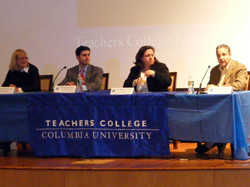Filed Under > TC Community
Times for a Change
With economic uncertainty driving applications to an all-time high, TC held its first-ever information session for potential career changes on June 22.
Yet even among people who, in many instances are coping with lay-offs and economic uncertainty, the desire for a new career that makes a difference to children and society is still a major motivation, Rock said.
“It is through education that we will create a better society,” Rock told the assembly. “We really see people who want to contribute in that way.” Separately, Rock said applications to TC are up six percent over last June and are running at an all-time high. The “yield,” or the percentage of accepted students who have put down a deposit for the fall, is steady at 50 percent, while the percentage of paid depositors who have also registered for fall classes is up nearly 10 percent, to 1,692 from 1,542.
James Brown, an economist with the New York State Department of Labor, told the assembly that “one thing that happens in every downturn is that a lot of people sign up to be teachers.” But even as the supply of new teachers increases during a recession, demand is also firm, Brown said. Education jobs are “recession-positive,” especially in New York City, which decades ago transitioned from an industrial to a knowledge-based economy. Demand, he said, is up for private elementary and secondary teachers, individual and family social services, child day care workers, health educators and technical and trade school teachers.
Attendees at the information session included an ex-Army officer set to start Teachers College in the fall, who is already working at one of the Promise Academy charter schools in Harlem; a TC arts education student who wants to work in a museum after graduation; and a former marketing professional who left profession due to the recession and wants to do something entirely different. She is starting a dual certification program in early childhood and special education in the fall.
Because of the breadth of its offerings, Teachers College is uniquely positioned to help meet diverse personnel needs, said President Susan Fuhrman in her welcoming remarks. In addition to preparing about 700 new teachers every year, Fuhrman noted that TC also graduates health educators, nursing educators, nutritionists, human resource and management professionals, psychologists, adult educators, arts administrators, information technologists--to name just a few of the professional paths available across more than 100 academic and professional programs.
The breadth of the College’s professional reach was reinforced by a panel discussion by four TC alumni, only one of whom is currently working in education. The panelists were Jan Hammond, an associate professor of educational administration at the State University of New York at New Paltz; Jonathan Stearn, a change management consultant with Robert H. Schaffer & Associates; Katherine Rodi, an attorney and senior counsel in the Office of the General Counsel for the New York City Department of Education; and Robert J. Lafayette, an applied anthropologist and organizational and business consultant.
The panelists acknowledged that, especially in the current economic climate, taking a pay cut to go back to school is risky. But they all said that for them, it had worked out well. “I came back to school at 42, not necessarily because it was going to make me a lot of money. I did it because it was going to make me a better person,” Lafayette said. Rodi added, “With my TC degree, I was interviewed all over the place. I was always employed.”
Once they leave TC, graduates often still have many career options. To narrow the field, “talk to everyone” for advice and information, Stearn advised. “Talk, talk, talk--and listen.” Rodi, meanwhile, was by turns practical, suggesting that job seekers should always have an appropriate, dry-cleaned interview suit on hand. (“Seriously. I was in Macy’s the night before my job interview, buying a new suit.”) and inspirational: “Don’t underestimate your abilities.”
Published Wednesday, Jun. 24, 2009
